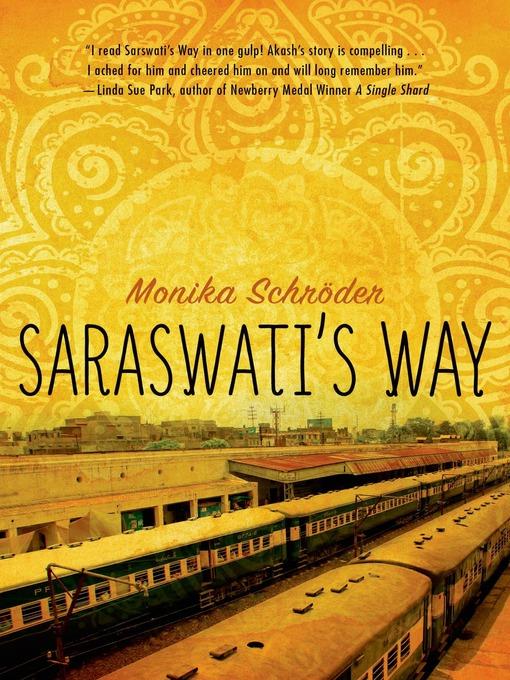
Saraswati's Way
فرمت کتاب
ebook
تاریخ انتشار
2010
Lexile Score
790
Reading Level
3-4
ATOS
5.1
Interest Level
4-8(MG)
نویسنده
Monika Schröderشابک
9781429985604
کتاب های مرتبط
- اطلاعات
- نقد و بررسی
- دیدگاه کاربران
نقد و بررسی

October 18, 2010
Twelve-year-old Akash, a math whiz living in rural India, longs to stay in school and win a scholarship so that he can go to school in the city. But for that to happen he needs a tutor, and his family of farmers already faces terrible debt. When Akash's father, his only living parent, dies, his grandmother gives Akash to a moneylender to do slave labor in his quarry. Quickly realizing that he will never pay off his family's debt working there and unwilling to return to the family that sent him away, Akash escapes and makes his way to Delhi, where he struggles to find income to support his dream. He befriends the kind owner of a newspaper stand, but his desperation to find a tutor leads to a stint dealing drugs. Schröder's (The Dog in the Wood) well-paced novel is filled with details about life on the streets of Delhi and the influence of Akash's Hindu faith. If Akash's single-mindedness in his goal makes him a bit one-dimensional, his thoughtfulness and determination should inspire those who have it much easier. Ages 10–14.

October 15, 2010
Akash, in his seventh and last year of education in India, has a gift for math, finding patterns in numbers by using Vedic math, an ancient system of Indian mathematics. The Hindu boy prays to Saraswati, goddess of wisdom and knowledge, to help him raise money to hire a tutor and win a scholarship, but when the monsoon fails to bring rain to his family's crops and his father dies unexpectedly, he is forced to work in their landlord's quarry. Quickly realizing that he will never pay off the debt, Akash runs away to New Delhi, where his experiences give an authentically gritty portrait of life on the streets. Homeless and hungry, he follows a group of boys, some sniffing correction fluid to forget their troubles, others gambling and dealing drugs. With the help of a kind newspaper seller, Akash realizes that Saraswati will only help him if he deserves it. Although most runaways' lives turn tragic, the author mercifully offers a hopeful ending. This rare combination of math and culture is a boon for discussions and makes this stand out. (author's note, glossary) (Fiction. 10-14)
(COPYRIGHT (2010) KIRKUS REVIEWS/NIELSEN BUSINESS MEDIA, INC. ALL RIGHTS RESERVED.)

December 1, 2010
Gr 5-7-With his talent for math, 12-year-old Akash dreams of escaping his dreary existence by winning a school scholarship. He and his widowed father, Bapu, eke out a precarious existence with their extended family in rural Rajasthan, a drought-plagued region of India. After Bapu's death, Akash is sent to a quarry to work off his family's insurmountable debt. He runs away and ends up living in the New Dehli train station. He forages through trash heaps to find food, joins a group of homeless children, and moves from one perilous situation to the next. In one of the most harrowing episodes, he and a friend sell drugs for a dangerous drug lord. Akash's story is involving, yet the fast-paced plot outpaces character development, and the hopeful ending arrives abruptly. In an author's note, Schroder briefly describes the plight of street children in India; she also adds interest with references to Vedic math and Hindu gods. Despite its good intentions, Akash's story remains too thinly sketched to be memorable.-Marilyn Taniguchi, Beverly Hills Public Library, CA
Copyright 2010 School Library Journal, LLC Used with permission.

December 1, 2010
Grades 4-7 In Rajasthan, India, 12-year-old Akash loves math, and he dreams of earning a scholarship to further his studies. After his fathers abrupt death, though, his grandmother sends him to work in a quarry to pay off the familys deep debt. Quickly realizing that loan-shark interest rates will never allow his family to reduce what they owe, Akash escapes by sneaking onto a New Delhi-bound train. In the bewildering big city, he joins a group of street kids who feed themselves from garbage scraps and earn coins by collecting plastic bottles. Schrder, a German-born educator who now lives in India, frankly exposes the harsh realities of the street childrens world: many sniff corrective fluid for a cheap, brain-melting high, and even Akash tries selling drugs to make the quick money he needs to continue his education. Eventually, though, Akash begins to find real opportunities and support. With skillfully integrated cultural details (further explained in an appended glossary and authors note) and a fully realized childs story, Schrder presents a view, sobering and inspiring, of remarkably resilient young people surviving poverty without losing themselves.(Reprinted with permission of Booklist, copyright 2010, American Library Association.)

























دیدگاه کاربران